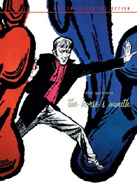The Horse's Mouth
| Great artists are not always great men, especially Gulley Jimson, the brilliant scoundrel at the heart of The Horse's Mouth. Played by Alec Guinness in what many consider to be the consummate character actor's finest comic performance, Gulley is an irredeemable rogue who we love anyway, which is testament to both Guinness' acting prowess and his writing ability, as he penned the screenplay based on Joyce Cary's much-beloved 1944 novel. It has always been one of the great joys of fiction on both the page and the screen that it can make us care for characters who, in real life, we would not even want to share space in a room. When the story opens, Gulley is being released from a month's stay in jail for harassing Hickson (Ernest Thesiger), a wealthy old man who has helped support Gulley's painting career, but also bought 18 of his early canvases for almost no money in order to settle a debt. Gulley owes money to a lot of people, including Miss D. Coker, a miserable spinster barmaid ("It not fair of God to make a girl and give her a face like mine," she declares at one point) who is determined to get her four pounds back from Gulley. Because Gulley has no discernible means of making any money any time soon, she determines that the best course of action is to get his canvases back so he can sell them, make a fortune, and repay his debt to her. This is not so easy, of course. At first, they think the paintings are in the possession of Gulley's ex-wife, Sara Monday (Renee Houston), a wily old woman who puts on airs of decency and formality, but is underneath as cunning as they come, particularly when it comes to one special painting with which she will not part. Gulley is not particularly interested in retrieving his old work--he is thinking about the future and his dream project that will put him among the painting greats, which is an enormous mural of The Fall of Man, The Raising of Lazarus, and The Last Judgment. The crux is, where to paint it? What wall is grand enough and worthy enough for such a project? Gulley takes an initial stab at it by painting a wall in the lavish flat owned by Lord and Lady Alabaster (Arthur Macrae and Veronica Turleigh), admirers of his work who make the mistake of going away on vacation and leaving him with run of their flat. In an extended comic sequence, Gulley goes to work, turning the once beautiful room into a disaster area when he allows a sculptor friend to work there, as well. The final punchline is bittersweet, as Gulley looks at the finished product and laments that it was not at all what he intended. This, of course, is always the great challenge of any artist--how to translate the images in one's mind into something that others can experience? "It's not what I meant," he says quietly. "Not the vision I had. Why doesn't it fit like it does in the mind?" Gulley does eventually find his wall, and in the most unlikely of places. His supreme accomplishment is realized, but not in the manner you would expect, and it turns out to be a very temporary work, indeed. If Gulley the artist triumphs in the end, Gulley the human being is never quite redeemed--he is still a selfish, scruffy scoundrel when all is said and done, and to have it any other way would be an unforgivable cheat. But, he does prove that he belongs among the artistic greats. When writing the original novel, Joyce Cary based much of Gulley's eccentric character on the self-destructive, wild bohemian poet Dylan Thomas, with whom Cary was friends. Gulley has also been connected with William Blake, whose poetry he quotes at several points in the film. Like Blake, Gulley is an artist of great vision, one who wants to create myth in his work. For all his comic excessiveness, there are moments in the film in which we truly understand how much Gulley loves art for art's sake, particularly a moving moment in an otherwise humorous sequence in which he tries to explain to Coker, who is rather thick-headed and resilient, how she should look at one of his paintings. The Horse's Mouth was directed by Ronald Neame, who began as a cinematographer (he shot 1938's Pygmalion, among others) and also worked as a producer for David Lean on some of his prestigious early films, including Great Expectations (1946), which he also cowrote, and Oliver Twist (1948), both of which starred Alec Guinness. He began directing in the early 1950s, and his career covered some three decades and an eclectic slate of projects, from the quirky character study The Prime of Miss Jean Brodie (1969), to the silly disaster epics The Poseidon Adventure (1972) and Meteor (1979). In The Horse's Mouth, Neame doesn't offer much visually, but rather allows Guinness to hold the screen with his fine, gravel-voiced performance. Gulley is the kind of character who demands camera attention, and any superfluous aesthetic decisions on Neame's part would have likely been to the detriment of the film's comedy. At most, he punches up Gulley's character on the soundtrack, using rakish choice cuts from Prokofieff's "Lieutenant Kije" Suite as a kind of character theme. But, music or no music, this film belongs to Alec Guinness, whose idea it was to adapt Cary's novel in the first place. And, even if The Horse's Mouth doesn't all come together in its entirety (it often feels like a series of setpieces, rather than a flowing narrative), the sheer joy of watching one of the great screen actors do what he does best is more than worth it.
Copyright © 2002 James Kendrick | |||||||||||||||||||||||||||||||||||||||||
Overall Rating: 


 (3.5)
(3.5)


